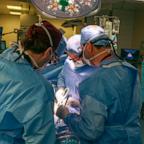Longer Hormone Treatment May Improve Prostate Cancer Outlook
June 11 -- WEDNESDAY, June 10 (HealthDay News) -- Men with moderately advanced prostate cancer who get hormone-blocking drugs after radiation therapy do better when the drug treatment is continued for two or more years after an initial six-month regimen, a European study has found.
The results pretty much mirror those of a similar American trial reported in May, said Dr. Eric M. Horwitz, acting chairman of radiation oncology at Fox Chase Cancer Center in Philadelphia, who led the group that did the U.S. study.
"We have long believed that longer-term hormone therapy is the standard of care," Horwitz said. "These studies support that belief."
The results apply to men whose cancer shows signs of growth but has not spread beyond the prostate gland -- perhaps a quarter of all cases of prostate cancer, Horwitz said.
Earlier studies in the United States and Europe established the value of radiation therapy followed by six months of hormone-blocking treatment in such cases, he said. The new studies were designed to determine whether continuation of drug therapy that blocks the cancer-promoting activity of the male hormone testosterone could improve those results.
Though the studies differed in size and length, their results were similar in most respects.
The European trial, reported in the New England Journal of Medicine, included 970 men who were assigned to radiation therapy followed by either six months or three years of hormone-suppressing treatment. The five-year death rate of men in the longer-treatment group was 15.2 percent, compared with 19 percent for those in the shorter-term treatment group.
The U.S. study, published in the Journal of Clinical Oncology, included 1,554 men who were followed for 10 years. The study found no significant difference in overall survival -- 51.6 percent for the short-term group, given four months of treatment, and 53.9 percent for the long-term group, treated for two years.
But it did find a difference among men who were alive and cancer-free after 10 years. The disease-free survival rate for the short-term group was 13.2 percent, compared with 22.5 percent for those treated longer.




